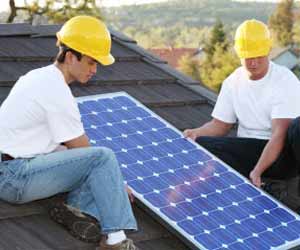Solar Panel Installer Jobs
Construction Sector
Solar panel installers are responsible for installing solar panels onto rooftops of residential homes, eco-friendly condominiums, outdoor lighting systems, and anywhere else where solar panels are needed.
A solar panel installer may install either photovoltaic (PV) solar panels, which convert the sun’s rays into electricity, or solar thermal panels, which capture the sun’s rays for usable heat. A solar panel installer may install panels on the ground, on roof tops, on the sides of buildings or on poles. Because solar panels function best with maximum sunlight, they are usually placed in elevated places, so solar panel installers spend a lot of time working in high-up places like rooftops and the tops of poles. Needless to say, solar panel installers can’t have a fear of heights.

Before he can get to work, a solar panel installer must first assess the area where panels are to be placed in order to ensure that there is enough room for panels and that the structure on which they are to be placed is strong enough to hold them. Next structural framing is attached to the surface; this is what the panels will be attached to. A solar photovoltaic installer must next connect the panels to the appropriate wires and then guide these wires to an inverter box. The inverter will take the energy generated by the solar cells and convert it into an alternating current (AC) of electricity which can be used for everyday power needs. This wiring work must be done by a licensed electrician. Some solar photovoltaic installers also hold electricians’ licenses, while others work with electricians who complete this part of the work.
Educational and Training Requirements
The majority of solar installers have at least a high school diploma and some sort of experience in mechanical or electrical installation.
Construction experience, especially roofing, can also be useful since solar panel installation often requires installers to work in high spaces and on dangerous surfaces like uneven or slanted rooftops. An associate’s degree in electrical work or a related field is also valued by employers and may help installers gain advancement opportunities more quickly. Although a degree is helpful, most of a solar installer’s skills can be learned on the job. Solar installers need to master a variety of mechanical skills to perform their work, including the use of power and hand tools, electrical knowledge, and basic math and problem-solving skills. It is also important for solar installers to be capable of heavy lifting, as a typical solar panel can weigh from 30 to 40 pounds. Although certification as a solar panel installer is not required in all states, it can help with career advancement.
Salary and Advancement Opportunities
According to Bureau of Labor Statistics sources, there are an estimated 7,000 solar photovoltaic installers currently working in the US, about half of them located in the state of California.
Solar panels are especially popular in California because the state provides great incentives for homeowners to install solar electric power, such as tax credits. As other states and the national government continue to increase incentives like these, the solar energy industry is expected to expand rapidly and opportunities for solar panel installers will increase. The Bureau of Labor Statistics cites industry sources which estimated that an entry-level solar photovoltaic installer earns an average of about $12 to $15 per hour. Those workers with certification or more advanced qualifications, such as an electrician’s license, generally earn more than this. Payscale.com reports that a solar system installer with one to four years of experience can expect from $14.24 to $19.50 per hour, while an installer with five to nine years experience earns an average of $17 to $20.96 per hour.


 Teach English in Asia
Teach English in Asia  Cruise Ship Jobs
Cruise Ship Jobs  Alaska Fishing Industry Jobs
Alaska Fishing Industry Jobs  Sharing Economy / Gig Economy
Sharing Economy / Gig Economy